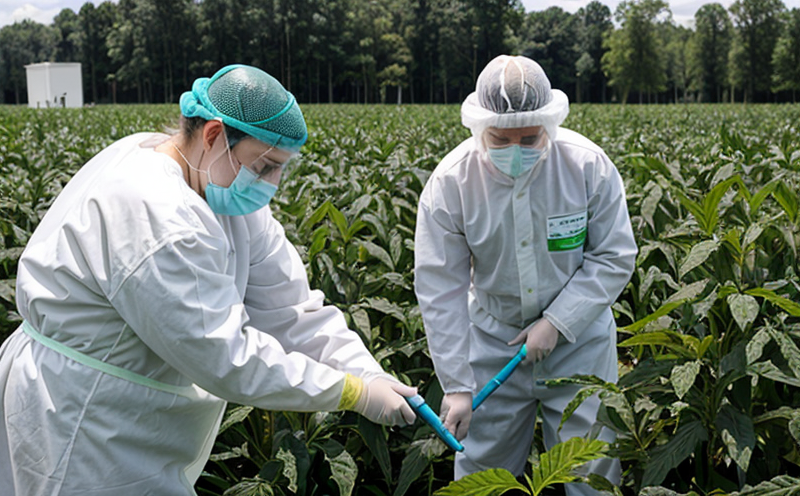ISO 17025 Laboratory Accreditation for Biocontrol Microbiology Testing
The ISO 17025 accreditation is a hallmark of excellence in testing and calibration laboratories. This standard sets the benchmark for competence, capability, and quality management systems essential to delivering accurate, reliable, and consistent microbiological test results. For biocontrol agents and beneficial microorganisms, ISO 17025 ensures that every step from sample collection to final report complies with stringent international standards.
Accreditation under ISO 17025 provides a robust foundation for laboratories specializing in biocontrol microbiology testing. It guarantees that the laboratory maintains rigorous quality assurance processes and adheres to established protocols, ensuring that the data generated supports sound scientific conclusions. This accreditation is particularly crucial when dealing with biocontrol agents, as their efficacy hinges on accurate identification and characterization.
The process of ISO 17025 accreditation involves a comprehensive review by an independent body. The laboratory must demonstrate its proficiency in all areas relevant to biocontrol microbiology testing, including:
- Testing procedures
- Certification and validation of equipment
- Data management systems
- Personnel qualifications
- Quality assurance policies
The accreditation ensures that the laboratory can consistently provide accurate, reliable, and traceable results. This is vital for industries such as agriculture, where biocontrol agents play a critical role in pest management and disease control.
The scope of ISO 17025 accreditation for biocontrol microbiology testing includes:
- Testing for the presence of beneficial microorganisms
- Evaluation of the efficacy of biocontrol agents
- Identification and quantification of microorganisms involved in biological control
- Assessment of environmental impact of biocontrol agents
The laboratory must also be capable of performing a wide range of microbiological tests, including:
- Enumeration of microbial populations
- Detection and identification of microorganisms using molecular techniques
- Microparticle-based assays for biocontrol efficacy
- Evaluation of microbial genetics in relation to biocontrol functions
The equipment used in these tests must be calibrated regularly, and all personnel involved are trained extensively. This training includes:
- Proper sample collection techniques
- Handling of hazardous materials safely
- Use of advanced microbiological techniques
- Data interpretation and reporting standards
The accreditation process is not a one-time event but an ongoing commitment. Regular audits by the accreditation body ensure continuous compliance with ISO 17025 standards. This regular review helps to maintain high-quality testing practices, which are critical for the reliability of biocontrol microbiology data.
| Application | Description |
|---|---|
| Agricultural Pest Management | Evaluation of biocontrol agents against specific pests |
| Disease Control in Livestock and Poultry | Testing for beneficial microorganisms that prevent or mitigate diseases |
| Environmental Remediation | Identifying microorganisms effective in bioremediation processes |
| Biodiversity Studies | Characterization of soil and water microbiomes for biocontrol potential |
The importance of ISO 17025 accreditation cannot be overstated, especially in the context of biocontrol agents. Accurate identification and characterization are essential to ensure that these microorganisms are used effectively and safely. The standard ensures that every step from sample collection to final report adheres to strict quality control measures.
Industry Applications
The applications for ISO 17025 accredited biocontrol microbiology testing span multiple sectors, including agriculture, environmental science, and biotechnology. Here are some key areas where this accreditation is particularly valuable:
| Application Area | Description |
|---|---|
| Agriculture | Evaluation of biocontrol agents for pest management and disease control. |
| Environmental Science | Testing microorganisms that can degrade pollutants or remediate contaminated sites. |
| Biotechnology | Development of new biocontrol products and processes. |
| Pharmaceuticals | Testing microorganisms used in the production of biopharmaceuticals. |
In each of these applications, ISO 17025 accreditation ensures that testing is conducted with the highest level of accuracy and reliability. This is particularly important for biocontrol agents, where even small errors can lead to ineffective or potentially harmful outcomes.
The process of ISO 17025 accreditation involves a detailed review of all aspects of laboratory operations, from sample handling to data analysis. This ensures that the laboratory meets international standards for quality assurance and quality control. The result is a high level of confidence in the test results, which is essential for decision-making in these critical areas.
Customer Impact and Satisfaction
The impact of ISO 17025 accreditation on customers is profound. It ensures that the laboratory delivers consistent, reliable, and accurate results every time. This consistency is crucial for making informed decisions about biocontrol agents and beneficial microorganisms.
Customers benefit from:
- Predictable and high-quality test results
- Reduced risk of ineffective or harmful products
- Enhanced reputation in the industry through adherence to international standards
- Increased trust in the laboratory's expertise and capabilities
The accreditation also provides a competitive edge by demonstrating a commitment to excellence. This is particularly important for businesses that rely heavily on biocontrol agents, such as agricultural companies and pharmaceutical firms.
In addition, ISO 17025 accreditation helps to build long-term relationships with customers. By consistently delivering high-quality results, the laboratory earns a reputation for reliability and accuracy, which fosters trust and loyalty.
Use Cases and Application Examples
- Evaluation of Bacillus thuringiensis (Bt) Strains: Testing for biocontrol agents used in agriculture to control insect pests.
- Assessment of Trichoderma spp.: Evaluating beneficial fungi that can protect plants from pathogens and improve soil health.
- Efficacy Study of Pseudomonas fluorescens: Testing a strain to determine its ability to suppress plant diseases.
- Microbial Diversity in Soil: Characterizing the microbiome for identifying potential biocontrol agents.
In each case, ISO 17025 accreditation ensures that the testing process is robust and reliable. This reliability is crucial for making informed decisions about the use of biocontrol agents and beneficial microorganisms.





